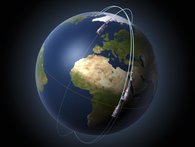SWESMAG - Investigation of Space Weather Effects by Swarm Magnetic Field Data and Relationship to Ground Observations
The project SWESMAG relies on magnetic field data from Swarm to investigate Space Weather (SWE) effects related to Geomagnetic Induced Currents (GICs), driven mainly by rapid variations of the ionospheric Polar Electrojet (PEJ) currents and quantified (loosely) by the variation of the horizontal ground magnetic field component dH/dt. Swarm mission can observe in-situ the Field-Aligned Currents (FACs, closed by the curl-free component of the ionospheric current) and remotely the PEJ currents (essentially the complementary, divergence-free component), and by that, both fundamental ionospheric current systems can be monitored at the same time.
SWESMAG builds on the measurement chain provided by Swarm FAC and PEJ observations, together with dH/dt data from ground stations. In order to match FAC observations to SWE needs, a new Sheet FAC (SFAC) index is implemented, which quantifies the magnitude of the large-scale FAC system by the maximum absolute value of the magnetic perturbation for each Swarm crossing of the auroral oval. This synthetic characterization of the FAC is both appropriate for the near-real-time regime (4 values per orbit, cadence of about 20-25 min per satellite) and suitable for comparison with PEJ intensity and dH/dt. Once the processing chain of SFAC and the correlation analysis of SFAC–PEJ–dH/dt are fully defined, a broader set of events will be selected and investigated.
Time Frame
Nov 2022 – Oct 2023
Funding
The European Space Agency (ESA) through Technical University of Denmark (DTU) - ITT 4.4 Swarm for Space Weather
Principal Investigators
- PhD Vlad Constantinescu (ISS) - Primary Coordinator
- Dr. Guram Kervalishvili (GFZ)
Personnel
- Jan Rauberg (GFZ)
Cooperations
- Institute of Space Science (ISS), Romania
- Rutherford Appleton Laboratory (RAL) Space, STFC, United Kingdom




